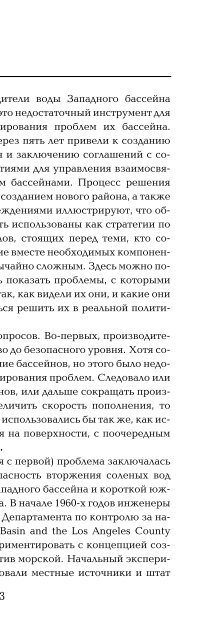Governing the commons
You also want an ePaper? Increase the reach of your titles
YUMPU automatically turns print PDFs into web optimized ePapers that Google loves.
Oakerson, R. J. 1988. Reciprocity: A Bottom-Up View of Political Development. In<br />
Rethinking Institutional Analysis and Development: Issues, Alternatives, and<br />
Choices, eds. V. Ostrom, D. Feeny, and H. Picht, pp. 141–58. San Francisco:<br />
Institute for Contemporary Studies Press.<br />
Okada, A., and H. Kleimt. 1990. Anarchy and Agreement — A Game Theoretical<br />
Analysis of Some Aspects of Contractarianism. In Game Equilibrium Models. Vol. II:<br />
Methods, Morals, and Markets, ed. R. Selten. Berlin: Springer-Verlag.<br />
Oliver, P. 1980. Rewards and Punishments as Selective Incentives for Collective<br />
Action: Theoretical Investigations. American Journal of Sociology<br />
85:356–75.<br />
Oliver, P., and G. Marwell. 1985. A Theory of <strong>the</strong> Critical Mass. I. Interdependence,<br />
Group Heterogeniety, and <strong>the</strong> Production of Collective Action. American Journal of<br />
Sociology 91:522–56.<br />
Olson, M. 1965. The Logic of Collective Action. Public Goods and <strong>the</strong> Theory of<br />
Groups. Cambridge, Mass.: Harvard University Press.<br />
Ophuls, W. 1973. Leviathan or Oblivion. In Toward a Steady State Economy,<br />
ed. H. E. Daly, pp. 215–30. San Francisco: Freeman.<br />
Ophuls, W. 1977. Ecology and <strong>the</strong> Politics of Scarcity. San Francisco: Freeman.<br />
Opp, K. D. 1979. The Emergence and Effects of Social Norms. Kyklos 32:775–801.<br />
Opp, K. D. 1982. The Evolutionary Emergence of Norms. British Journal of Social<br />
Psychology 21:139–49.<br />
Opp, K. D. 1986. The Evolution of a Prisoner’s Dilemma in <strong>the</strong> Market. In Paradoxical<br />
Effects of Social Behavior, eds. A. Diekmann and P. Mitter,<br />
pp. 149–68. Vienna: Physica-Verlag.<br />
Orbell, J. M., and L. A. Wilson. 1978. Institutional Solutions to <strong>the</strong> N-Prisoners’<br />
Dilemma. American Political Science Review 72:411–21.<br />
Orr, D. S., and S. Hill. 1979. Leviathan, <strong>the</strong> Open Society, and <strong>the</strong> Crisis of Ecology. In<br />
The Global Predicament. Ecological Perspectives on World Order, eds.<br />
D. W. Orr and M. S. Soros, pp. 457–69. Chapel Hill: University of North Carolina<br />
Press.<br />
Ostrom, E. 1965. Public Enterpreneurship: A Case Study in Ground Water<br />
Management. Ph. D. dissertation, University of California at Los Angeles.<br />
Ostrom, E. 1985a. Are Successful Efforts to Manage Common-Pool Problems a<br />
Challenge to <strong>the</strong> Theories of Garrett Hardin and Mancur Olson? Working paper,<br />
Workshop in Political Theory and Policy Analysis, Indiana University.<br />
Ostrom, E. 1985b. The Rudiments of a Revised Theory of <strong>the</strong> Origins, Survival, and<br />
Performance of Institutions for Collective Action. Working paper, Workshop in<br />
Political Theory and Policy Analysis, Indiana University.<br />
Ostrom, E. 1986a. An Agenda for <strong>the</strong> Study of Institutions. Public Choice 48:3–25.<br />
Ostrom, E. 1986b. A Method of Institutional Analysis. In Guidance, Control, and<br />
Evaluation in <strong>the</strong> Public Sector, eds. F. X. Kaufmann, G. Majone, and<br />
V. Ostrom, pp. 459–75. New York: Walter de Gruyter.<br />
365


